#tarkovsky is the best film maker ever no one comes close to him
Explore tagged Tumblr posts
Text


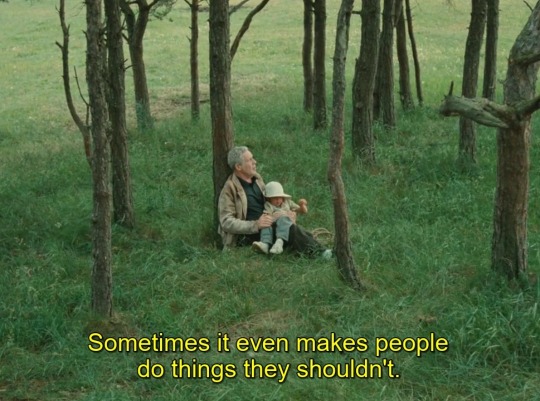
Sacrifice, (1986)
Dir- Andrei Tarkovsky
#this was tarkovskys last movie he made before he died.#tarkovsky is the best film maker ever no one comes close to him#movie scenes#movie quotes#movie stills#movie aesthetic#good movie#movie art#movies#film stills#films#film aesthetic#film art#andrei tarkovsky#cinema#cinephile#art#80s movies#80s art#retro movies#80s#90s movies
196 notes
·
View notes
Text
SCUM IN THE AISLES #4 (The House That Jack Built: Unrated Director’s Cut)
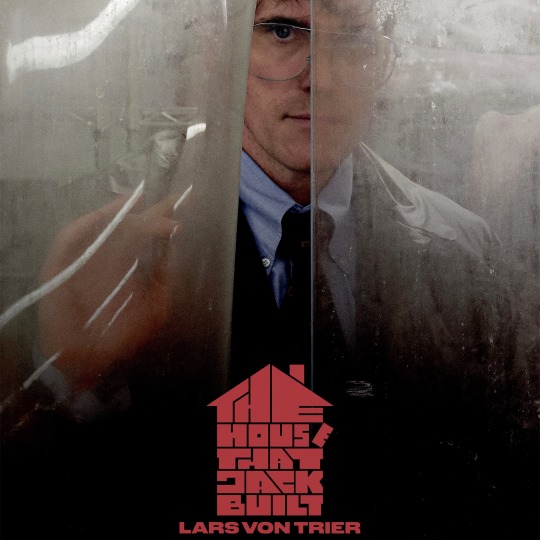
Sometimes, in order to seek out the weirdest discarded slices of celluloid trash that cinema has to offer, one must leave the confines of their crappy apartment, and go to an actual movie theater. This is a column recounting my excursions into the b-movie wilds. This is Scum in the Aisles!
PART 1: ANTICIPATION
“You’ve all bought tickets for a Lars von Trier film, so you know what you’re getting yourselves into.”
With this, Justin Timms, the founder of the Brooklyn Horror Film Festival, and our host for this evening in a dark and chilly corner of Greenpoint known as the Film Noir Cinema, ceded the floor to the film we had all gathered to experience, The House That Jack Built. A two and a half hour art house serial killer epic by perhaps the most controversial filmmaker alive. A film that prompted both mass walkouts (anywhere between a dozen and a hundred people, depending on who you ask) and a ten minute standing ovation when it premiered out of competition at this year’s Cannes Film Festival. A film which has since been decried as a gruesome, sadistic, mean-spirited slog by some, and praised as a beautiful, self-reflexive act of provocation by others.
Timms, for his part, had just seen the film for the first time along with the crowd from the first screening of the evening, and he looked positively shell-shocked. All around me, the crowd buzzed with nervousness and excitement. What sort of celluloid horrors awaited us? Would we be able to stomach what was splayed up on the screen? Would cinema’s angry Danish trickster god once again succeed in getting under our skin and raising our cockles? Or had his flagellations, both towards himself and the audience that improbably keeps coming back (myself included), grown tired and stale?
Our host had claimed that we knew what we were getting ourselves into simply by showing up to watch a Lars von Trier film…but did we?
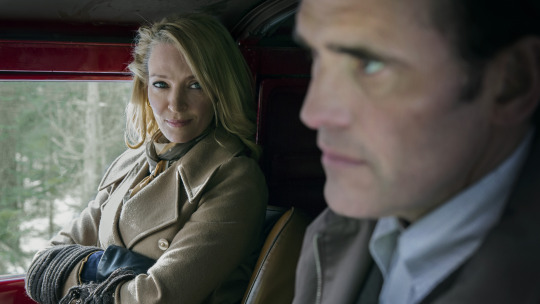
PART 2: SYNOPSIS
The House That Jack Built follows Jack (Matt Dillon, turning in a career best performance) over roughly twelve years of a very eventful life. Jack lives somewhere in the Pacific Northwest, he’s an engineer who dabbles in architecture on the side. He comes from a wealthy family; his inheritance allows him to buy a large plot of land by a picturesque lake and build his titular house. However, what Jack really loves, his true passion in life, is annihilating other human beings. Jack is not just A serial killer, he is THE serial killer. Dude makes Jeffrey Dahmer and Ted Bundy, both of whose real life exploits are alluded to via Jack’s activities in the film, look like slouches.
As von Trier likes to do, the film is divided into five chapters and an epilogue. The five chapters are each devoted to a specific murder out of the nearly hundred he commits that is supposed to make us understand why Jack does what he does. I’ll get to the epilogue later, because I have FEELINGS about it. Similarly, as von Trier also likes to do, Jack narrates these chapters in the form of a confession, in this case to a man named Verge (Bruno Ganz). With the first two chapters, von Trier catches us off guard by deploying humor. Aside from the violence, which is indeed quite brutal, von Trier manages to wring genuine laughs out of the absurdity of these situations. In the first chapter, Uma Thurman plays a rich woman with a flat tire who is so unpleasant and annoying that you can’t help but root for Jack to kill her. In the second chapter, Siobhan Fallon Hogan makes the mistake of believing Jack when he knocks on her door, first pretending to be a policeman, then incredulously switching gears and pretending to be an insurance salesman, before a comedy of errors involving Jack’s cleanliness-based OCD, a very annoyed local cop, and a telltale trail of blood ensues. The audience I saw it with tonight ate these moments up, partially laughing at the jokes themselves, then perhaps doubling down when we realized how inappropriate it was to be laughing in the first place.
However, the laughs quickly dried up once chapter three began. This chapter involved the shooting of children, and was the focus of much of the ire directed at the film after Cannes. Indeed, especially in a post-Sandy Hook world, the violence in this section was almost unbearable. Aside from seeing children gunned down in graphic detail, Jack then conducts some, shall we say, amateur taxidermy with one of the corpses, making for the second time in two films that von Trier has given us the nightmare image of a child with a horrifying rictus smile (shoutouts to the baby from Nymphomaniac Vol. II). Chapter four details the gruesome fate of Jack’s one and only girlfriend, played by Riley Keough. Von Trier ratchets up the tension here to near intolerable levels, foreshadowing a horrific act of mutilation a good ten minutes before it happens, and then showing it up close, in nauseatingly graphic detail. Most of the audience, myself included, watched this scene through our fingers.
Now, very quickly, I’ll say that, yes, for most normal moviegoers, the violence in this film will definitely be a lot. But speaking as a connoisseur of horror movies and weirdo genre experiments, it wasn’t anything outside of the ordinary. In fact, I found the violence in Antichrist to be way more upsetting and visceral than most of what you see in this film.
Chapter five sees Jack conducting a gristly experiment in his industrial freezer involving full metal jacket bullets. He also picks up a spiffy red hooded robe. This is where we catch up with the beginning of the film, and see Verge for the first time. As it turns out, Verge is here to chaperone Jack to the fires of Hell. This is where the Epilogue kicked off, and where the audience, myself DEFINITELY included, started to get a bit antsy. I seem to recall an old maxim that goes something like, you can do anything to an audience aside from bore them. Well, unfortunately, I found this Epilogue to be almost unbearably boring. Aside from some stunning imagery, it was mostly tedious and pretentious, straining for some sort of higher message that was just unnecessary. If I had to sum it up in one sentence, it would be: Tarkovsky by way of Tim and Eric. Normally that would be a compliment coming from me. All the pretty pictures in the world means nothing if the audience is reaching for their coats.
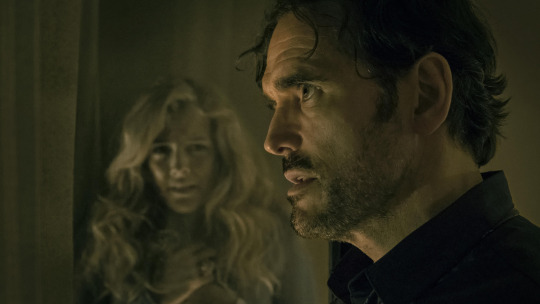
PART 3: INTENTIONS
So what is von Trier trying to tell us with all of this madness? What does he want us to take with us once we leave the theater? If you follow his filmography, it’s not a big scoop to say that von Trier’s most recent work, starting with Antichrist and continuing through Melancholia and the Nymphomaniac films, have been somewhat autobiographical, sort of his version of State of the Union addresses. The House That Jack Built feels like the culmination of this stage of his career. In this film, von Trier puts himself on trial, with Dillon’s Jack as his surrogate. Just like with the Nymphomaniac films, there are many, many, MANY flowery, pseudo-philosophical digressions on a number of topics, accompanied by slides and bits of archival video (I’ll bet someone out there is kicking themselves for ever having introduced von Trier to Shudderstock), including the poetry of William Blake, photography, love, deer hunting, gothic architecture, and Glenn Gould. One especially epic digression finds Jack opining on dessert wines, the Third Reich architect Albert Speer, and finally the artistic integrity of von Trier’s own cinematic oeuvre, complete with clips from his previous films. Ballsy, no?
I would be lying to you if I said I understood everything that von Trier was trying to convey with these digressions. However, it is definitely clear to me that this film is meant to function as sort of a statement to the jury in the court of public opinion. Von Trier has always put himself at the forefront of his films more so than most directors, displaying his name alongside, or sometimes above his actors (hell, for this film, he even devoted an entire poster to himself). This, of course, means we the audience tend to read his films as glimpses into its maker’s psyche more than we would for most other directors, which is not entirely fair in my opinion, but it’s a blessing and a curse that von Trier has brought on himself. So what does he want us to understand about himself after we’ve seen The House That Jack Built? It seems to be something along the lines of, yes, every awful thing you’ve said about me is true, and you could never hate me as much as I hate myself, but I only answer to a higher power. Which, yeah, ok...but is that enough? Or, to put it more succinctly, is that even that interesting of a conclusion? We’ve now sat through nearly ten hours of von Trier’s cinematic therapy sessions over the last decade, and he basically ends it all by pulling a Tupac on us: only God can judge me.
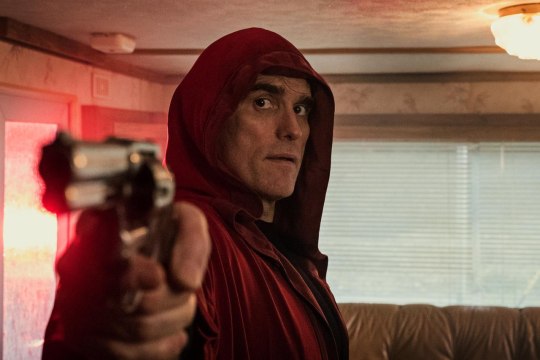
PART 4: MISANTHROPY
The best and most succinct description of von Trier’s modus operandi as an artist that I’ve yet to hear comes from the excellent YouTube movie review show Welcome to the Basement. During their most recent episode, while giving a (largely negative) critique of Dogville, co-host Matt Sloan describes von Trier as “a provocateur that has the talent to back it up.” Indeed, if von Trier was entirely the sum of his detractors claims, then he would’ve been forgotten a long time ago. He does indeed have the cinematic bonafides, and they don’t let him down here: the camerawork in this film is gorgeous and intimate, the editing is kinetic and fast-paced, and as usual von Trier knows just how and when to perfectly deploy a pop song for maximum disarmament.
The most resounding jibe against von Trier is that he is a raving misogynist, due to the almost ludicrously awful levels of suffering that he puts his female protagonists through. For his part, von Trier has defended himself in the past by saying he is actually fighting against the patriarchy by showing the awful trials that women must endure in a society run by men. It’s a fair, if slightly dubious claim. Personally I’ve always been kind of dumbfounded that we seem to hold von Trier to these moral standards based on the fates of his fictional characters that we just don’t with other directors. What makes him an exception in this case? Wes Anderson and Yorgos Lanthimos depict gruesome animal deaths left and right in their films, but does anyone legitimately think that they hate pets? However, when it comes to The House That Jack Built, I cannot and will not defend von Trier against these accusations of misogyny. Almost none of the female characters in the film are even given a name, and the one exception, Keough’s “Jaqueline Simple,” is derided constantly by Jack and called stupid because of her last name. It becomes especially stark and uncomfortable when, at one point, Verge observes that the women Jack has discussed strike him as “unbelievably stupid,” as if they somehow deserved to die because of that. Jack just shrugs and says that he also killed men, but he just so happened to choose these stories of killing women “at random.” Mhmmm. Not buying it this time, bucko.
Then again, you could argue that, since this story is told from the perspective of a man who unapologetically murders women in the most gruesome and debasing of ways, it would be dishonest or nonsensical to show them otherwise. But that brings up a whole other can of worms: what does it say about von Trier himself that he seems to seriously identify with a mass murderer? At one point, the film alludes to, and seemingly tries to make excuses for, the infamous press conference following Melancholia’s Cannes premiere during which von Trier compared himself to and jokingly sympathized with Hitler, an act of provocation which earned him an unofficial “ban for life” from the festival (obviously this did not last). And perhaps I’m reading too much into this, but the scene where Jack experiments with killing multiple people at once with a single full metal jacket bullet reminded me of a director at work, setting up his shot, changing the angle, making sure everything is just right, except in this instance, the camera is replaced with a high powered military grade rifle. Jack does remark at multiple times throughout the film that he sees his killings as a sort of art. Does von Trier relate to this sentiment? Does he see the creation of art as an act of love, as Verge does, or more like Jack, as an act of decay and degradation? I’m guessing more the latter than the former.
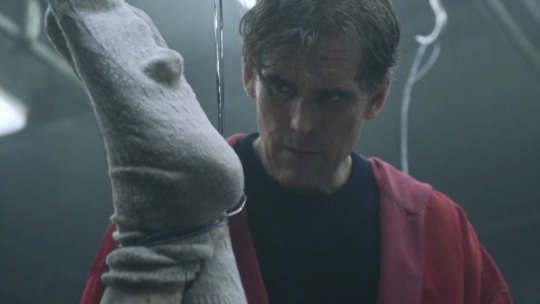
PART 5: DAMNATION
As good as Sloan’s summation of his modus operandi on Welcome to the Basement was, I have my own go-to log line: von Trier’s story is the story of a man who got everything he wished for, but was still miserable. For the first part of his career, von Trier was determined to an almost psychotic degree to be seen as one of the great auteurs of cinema. Anyone who didn’t agree was the fucking enemy. When his 1991 film Europa, which was up for the Palme d’Or at Cannes, won the Jury Prize instead, von Trier lashed out, calling that year’s jury president, Roman Polanski, “the midget” during his acceptance speech, and later hurled his trophy into the French Riviera in anger. But then his luck began to change. His next film to play in competition, 1996’s Breaking the Waves, won the Grand Prix and was nominated for an Oscar, and 2000’s Dancer in the Dark finally won him his long sought after Palme d’Or. After years of angrily bashing the world cinema establishment over the head with his own inflated opinion of himself, von Trier was finally one of the most respected and discussed filmmakers of the day.
The thing is, once you’re on top, there’s only one way you can go. He never finished his proposed “Land of Opportunities” trilogy, completing only the first two installments, Dogville and Manderlay, both of which were met with mixed to negative reviews. Von Trier soon found himself spiraling into depression and alcoholism, twin demons that he has wrestled with cinematically over the course of the last decade. It would not surprise me if The House That Jack Built was von Trier’s final film. On one hand, it feels like the thesis statement, the grand summary, of what he’s been trying to say with all of his films. On the other hand, in recent interviews, the guy just looks terrible. He’s frail, he’s got the tremors, his hair is unwashed and ratty and his clothes look ill-fitting and dirty. Despite getting sober not long after the Melancholia press conference debacle, it’s clear that alcohol abuse has taken quite a toll on him. Perhaps its gauche and inappropriate to speculate from afar on von Trier’s mortality, but he’s already done it himself, by making The House That Jack Built.
EPILOGUE: FUTILITY
Now that I’ve reached the end of this jeremiad of a review, I have to wonder, what was it all for? You’ve probably already made up your mind about whether or not you’re going to see this film. You’ve probably already got a very strong opinion on Lars von Trier, both the man and his work. Some of you are probably judging me for even having paid money to see this film, which is your right. Odds are, whatever you think about this filmmaker and his films are not going to be swayed either way by anything I have to say. And even if you did want to experience The House That Jack Built like I did, you can’t: last night was the only night that von Trier’s ���Unrated Director’s Cut,” the one that screened at Cannes, is going to be shown in theaters (a stunt that has apparently landed IFC Films in hot water with the MPAA), before an R-rated version is released next month. Was this a shameless promotional ploy? Yes. Did it still give us weirdo cinephiles the feeling that we were part of a super naughty super secret club? Absolutely. I didn’t know anyone in that dark and chilly corner of Greenpoint, but I feel connected to them for life, since we all went through this cinematic journey to Hell together. So, then, now that we’ve descended into the flames, how to describe The House That Jack Built? It is vibrant and stuffy and brilliant and maddening and hilarious and terrifying and pretentious and vulnerable and prescient and infuriating and awful and a masterpiece. In other words, it is a Lars von Trier film. You know what you’re getting yourself into.
youtube
#ANALOG SCUM#the house that jack built#lars von trier#ifc films#scum in the aisles#matt dillon#uma thurman#bruno ganz#siobhan fallon hogan#riley keough#horror#slasher#serial killer#gore#art house#world cinema#foreign film#cannes film festival#exploitation#cult#cult film#cult movie#brooklyn horror film festival#film noir cinema#directors cut
2 notes
·
View notes